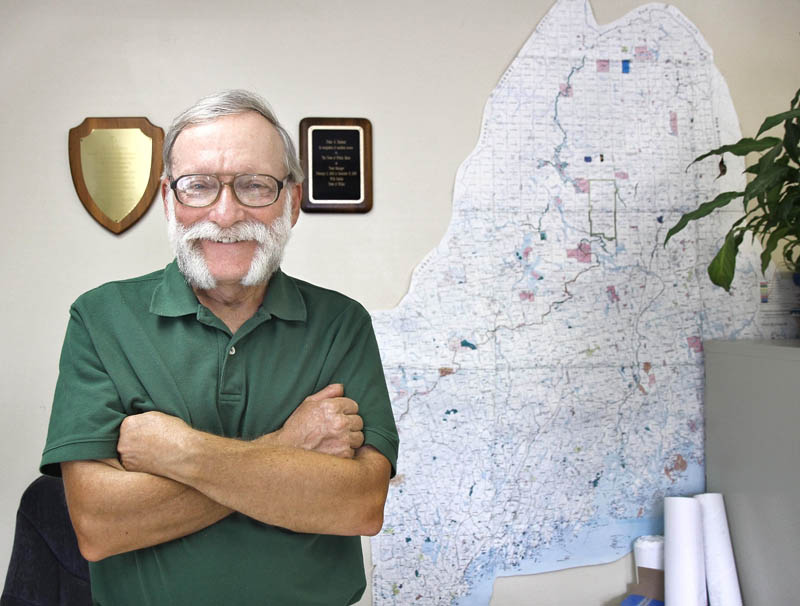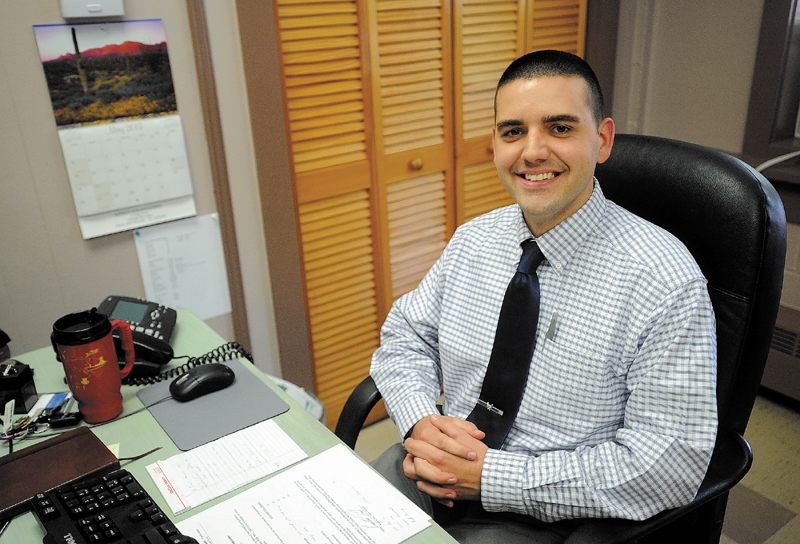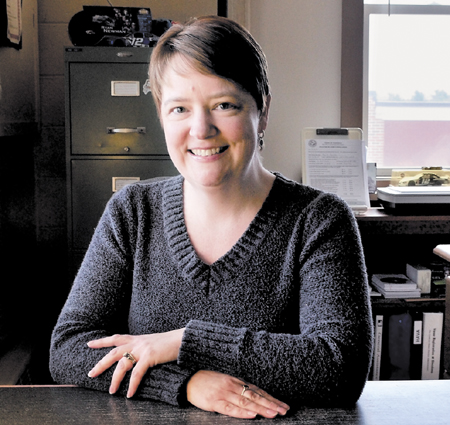Fairfield and Oakland, two mid-sized towns in the Waterville area that share a border, are amassing clout, knowledge and recognition as their town leaders move into prominent roles in important statewide municipal organizations.
The names may sound like a jumble of bureaucratic jargon, but groups such as the Maine Municipal Association, the Maine Town, City and County Management Association, the Maine Chiefs of Police Association and the Maine Town and City Clerks’ Association play a vital role in shaping how small government works in the state.
The associations help towns pave roads, arrest criminals, revitalize downtowns, foreclose on delinquent taxpayers, handle lawsuits or give public aid to those in need.
They also allow towns to band together for collective action — providing the leverage to negotiate lower rates for employee health insurance and to lobby effectively in the state capital.
Nearly every interaction a person has with town hall — from registering a car to getting a fireworks permit — is influenced by the groups.
And these groups, for the moment at least, are influenced by key town officials in Oakland and Fairfield.
In Oakland, Town Manager Peter Nielsen was recently named president of the Maine Municipal Association, while police Chief Michael Tracey is the president of the Maine Chiefs of Police Association.
In Fairfield, Town Manager Josh Reny was named Rookie of the Year by the Maine City, Towns and County Management Association in August, while Town Council Chairwoman Tracey Stevens, who formerly was town clerk in Fairfield, is the second vice president of the Maine Town and City Clerks’ Association.
The statewide associations work hard to achieve balance, ensuring that no single region or demographic gains too much clout within their ranks. Still, the area is well represented this year and in recent years, according to Eric Conrad, Maine Municipal Association spokesman.
Working together
One way Oakland’s Nielsen and Fairfield’s Reny have achieved success is by maintaining close ties to each other and to several other town managers in the region.
“One thing that most people don’t realize is that every month or two, the town managers try to get together for coffee in the morning and share ideas,” Reny said.
Several times a year, he said, the town managers of Belgrade, China, Clinton, Fairfield, Norridgewock, Oakland, Vassalboro, Waterville and Winslow gather to discuss regional issues like new fireworks laws, negotiating cable agreements or the natural gas pipeline that’s under construction.
Nielsen said the group works together, but doesn’t lobby to divert resources from other parts of the state.
“If we can advocate for a region in a way that won’t take away from other regions, we will,” he said. “Like, for example, an economic development piece.”
A casual observer in the Oakland town office might mistake the mild laid-back Nielsen for a farmer who has stopped by to chat about community events, rather than the person who oversees nearly every detail of the town’s business.
He often defuses a potentially tense situation with dry humor, delivered deadpan from behind his eyeglasses and whitening mutton chops.
“He’s very good at listening,” Reny said. “So when he speaks, you’re interested to hear what he has to say.”
Reny, 32, is equally agreeable, but he projects the vibrant energy of an entrepreneur whose business is the town and whose passion is to see that business grow and prosper.
During conversations, Reny is active, restating what’s been said to him to make sure he understands and to make sure everyone in the room understands each other.
While their styles differ, both cited their relationships to statewide and regional associations as a major factor in their effectiveness.
“It sometimes helps me to be ahead of the curve instead of behind the curve,” Nielsen said.
Stevens, too, said her role as chairwoman of the clerks association’s legislative and policy committee gives her expertise that benefits the town.
“I was up on the latest news and the latest laws that were passing,” she said. “If you’re not involved in that process, it’s hard for you to find the new laws that are going to pass.”
In the digital age, access to information isn’t the issue — it’s being able to filter through it and understand what specifically is going to help a community, according to Michelle Beal, president of the Maine Town, City and County Management Association.
“There’s a lot of information out there in the world and you can get things off the Internet, but there’s nothing like face-to-face conversations, being able to ask questions,” Beal said.
Working in a vacuum
Communities that don’t take advantage of the networking opportunities offered by larger organizations suffer, Beal said.
Participation, she said, “really prevents a manager from working in a vacuum, which is probably one of the worst things that you can do.”
Reny said that, without state associations, it can be easy for a town government to become isolated, a small pool of interests and talents offered by a handful of employees and elected officials.
“It would be very difficult for municipalities to go it alone” for things like leveraging political clout or managing insurance costs, he said.
In some towns, elected officials can rein in their town manager’s ability to participate in statewide organizations.
“If you’re manager, you need the support of the city council,” Conrad said from his office at the Maine Municipal Association. “They have to see that value.”
Farmington selectmen in June signed a letter endorsing Town Manager Richard Davis as a mentor in a program offered by a Maine Municipal Association-affiliated group, but they withdrew their support with a 3-2 vote two weeks later.
Farmington selectmen Ryan Morgan and Andrew Hufnagel opposed Davis’ participation because they were concerned it would take too much time away from working on the town budget.
By contrast, Nielsen received a letter of support for his presidency from the Oakland council, while Reny was nominated as Rookie Manager of the Year by Stevens, the chairwoman of the Fairfield town council.
In the nomination letter, Reny was credited with giving the town new vitality since he was hired in December 2010. According to the letter, when Reny took the reins, “the town’s fund balance had been in decline and a plan was needed.”
According to Stevens, Reny rebuilt the town’s fund balance, proposed three consecutive budgets that didn’t contribute to tax increases, and played a key role in Fairfield’s downtown revitalization, which includes the redevelopment of the Gerald Hotel into senior housing, the demolition of aging buildings and the attraction of new businesses.
Stevens said she had no worries about the time it takes Reny to serve on the boards of FirstPark, the Municipal Committee Review, the Central Maine Growth Council, and the Kennebec Valley Council of Government, among others.
“He’s not a 40-hour-a-week guy,” she said. “He puts in the hours and he gets the job done.”
Reny said he struggles sometimes to maintain the right balance.
“I don’t want to overextend, and I have a million things on my plate,” he said.
People should care about the connectedness of their town officials, Reny said, because they result in opportunities for the town, sometimes through partnerships or grants, that make their lives better.
For example, he said, at a workforce development meeting, he was introduced to a program that provides training and mock interviews for those seeking work. Reny offered to allow the program to use space in the Fairfield community center, which has increased its presence in the community and, possibly, helped local unemployed residents to find work.
The impact can be subtle, but all of the little opportunities — a workforce training program, a grant, a tip on how to get a better renovation contract — add up to making the town a better place to live, he said.
Matt Hongoltz-Hetling — 861-9287
mhhetling@mainetoday.com
Send questions/comments to the editors.






Success. Please wait for the page to reload. If the page does not reload within 5 seconds, please refresh the page.
Enter your email and password to access comments.
Hi, to comment on stories you must . This profile is in addition to your subscription and website login.
Already have a commenting profile? .
Invalid username/password.
Please check your email to confirm and complete your registration.
Only subscribers are eligible to post comments. Please subscribe or login first for digital access. Here’s why.
Use the form below to reset your password. When you've submitted your account email, we will send an email with a reset code.